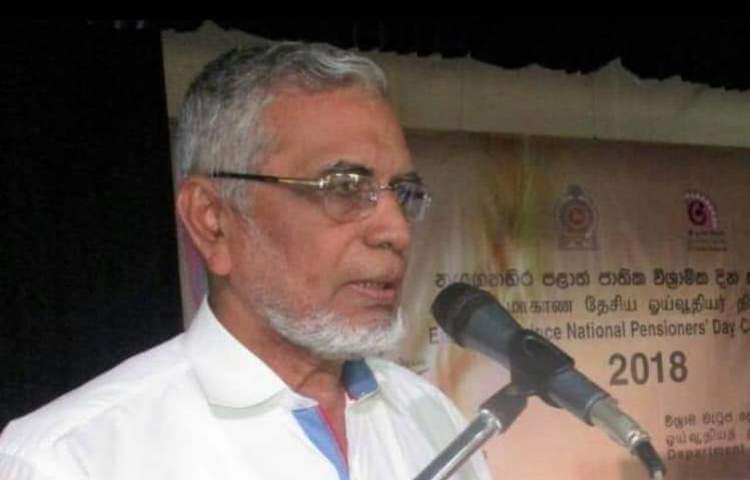By A. L. A. Azeez
COLOMBO (IDN) — Much-loved and respected Dr Mohamed Jameel of Sainthamaruthu passed away on September 24.
The last time I visited him in 2020, he received me with open arms, shared with me his anxiety over what was then going on in the country and within the community, and discussed his ideas for how healing and reconciliation should be advanced at every level of Sri Lankan society and asked me about my future plans.
If I would call Late Dr Jameel a great man, it would just be an ordinary term for the far greater personality he was.
He believed in inter-ethnic and inter-religious harmony, but unlike some who so believe but do nothing, he actively worked for it, provided leadership to it, and manifested it in all that he did.
In every conversation we had in person or on the phone, he talked at length about what could and should be done to promote mutual understanding and accommodation between the Tamil and Muslim communities in the East and the Kalmunai area in particular.
He felt particularly indignant that those who had the power to help bring the two communities together after years of misunderstanding used it instead to further divide them for short-term political gains. East could have been made a model for national cohesion, building a strong rapport with the Sinhalese community there.
Our respect was mutual but differential. The added element in the equation was my admiration for his wisdom and his ever-strong ‘inner core’, which, despite all odds around him, made him stick to his principles at all times. On all ‘uniting’ aspects of intra-community and inter-community relations, he was mainstream, and on all what he perceived to have the potential to cause ‘discord’ among people, he was a silent warrior against it.
He had this immutable belief that Sri Lankan politics—and indeed, the dominant politics in the area—caused deep ‘wounds’ among people. Then as the aggrieved people clamoured for healing or solution in their name, another kind of politics emerged that gave agency to the wounds to perpetuate and proliferate. This was how he felt the marginal became mainstream across the wider society over time.
He was a medical practitioner living among people till his last breath. As a people’s doctor, his knowledge about ‘social wounds’ or ‘social ills’ was sound enough, but he had no wherewithals to treat them all much as he would have liked to. He did the best he could, though.
The ‘aloofness’ he showed from the marginal-turned mainstream in later years, arose essentially, I believe, from the distinction he made between his genuine care for ‘wounds’ and the impulse of those who claimed to be the custodians of the ‘wounded’ to keep the wounds for another day. In later years, he assiduously avoided almost all political or social events of whatever hue that took place within the wider region or across the country perhaps for this reason. His aversion towards harm-making nature of political power that regional politicians and those on the national stage so disdainfully wielded, played its part, too in his ‘aloofness’.
It gave me immense satisfaction to learn, however, that the Board of Trustees of Sainthamaruthu Jummah Mosque fittingly honoured him for his varied contributions to the community at large, especially considering how committedly and selflessly he worked to help people affected by the Tsunami in 2004.
Especially since 2010, he had remained in constant contact with me wherever I lived. He called me and sent messages appreciating me each time I chaired a meeting or organised a Sri Lanka promotion event during my postings abroad, whenever the media reported on them, or he heard from other sources. All his messages were encouraging and positive. Some of them reflected his thoughts and ideas for how nation-building efforts should be pursued, to be successful and what role religious and community leaders should play in making the country achieve sustainable peace.
It appeared to me reading some of his messages that he was keen to organise a programme on inclusion and diversity with a particular focus on youth empowerment and youth leadership. He wanted to have it, especially in the Eastern Province involving youths from all communities. I offered to do it upon my return to Sri Lanka from my last posting. Unfortunately, it never materialised due to the Covid-19 pandemic and the multiple crises that the country was fraught with simultaneously.
Nevertheless, I owe him that; it must be organised at least on a reduced scale one day since the current economic situation would not allow undertaking a much larger endeavour. Maybe it can be a pilot project that can help bring people together even as the ‘political power’ that Late Dr. Jameel disliked may still try to keep them apart.
Innalillahi wa inna ilaihi rajioon.
May Almighty Allah grant him Jennathul Firthous! [IDN-InDepthNews – 25 September 2022]
Photo: Late Dr. Mohamed Jameel of Sainthamaruthu
IDN is the flagship agency of the Non-profit International Press Syndicate.
This article is published under the Creative Commons Attribution 4.0 International licence. You are free to share, remix, tweak and build upon it non-commercially. Please give due credit.

